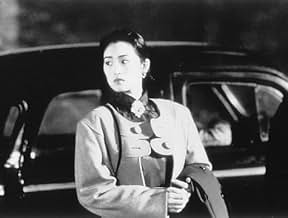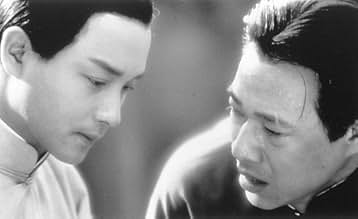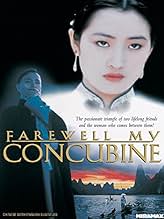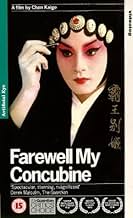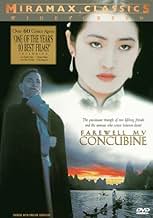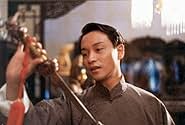IMDb रेटिंग
8.1/10
35 हज़ार
आपकी रेटिंग
दो लड़के, 1924 में, पेकिंग के एक ओपेरा ट्रेनिंग स्कूल में मिलते हैं. उनके बीच हुई दोस्ती लगभग 70 वर्षों तक चलेगी और चीन के इतिहास के सबसे अधिक परेशानी वाले समय की गवाह बनेगी.दो लड़के, 1924 में, पेकिंग के एक ओपेरा ट्रेनिंग स्कूल में मिलते हैं. उनके बीच हुई दोस्ती लगभग 70 वर्षों तक चलेगी और चीन के इतिहास के सबसे अधिक परेशानी वाले समय की गवाह बनेगी.दो लड़के, 1924 में, पेकिंग के एक ओपेरा ट्रेनिंग स्कूल में मिलते हैं. उनके बीच हुई दोस्ती लगभग 70 वर्षों तक चलेगी और चीन के इतिहास के सबसे अधिक परेशानी वाले समय की गवाह बनेगी.
- 2 ऑस्कर के लिए नामांकित
- 24 जीत और कुल 12 नामांकन
Zhenxiang Fei
- Shitou as a Child
- (as Yang Fei)
फ़ीचर्ड समीक्षाएं
I finally got a chance to see "Farewell my Concubine." I'd been anxious to see it since its initial release in 1993. It surprised me in its depth and technical skill.
Three points make this film outstanding. The first is the technical skill of the director and the luscious taste of the director of photography. The entire film is a feast for the eyes, taking full advantage of elaborate costumes and exotic locations. The second strength is in the actual storytelling. The plot is a fascinating tragedy, it feels almost Shakespearean. The acting is nothing short of incredible. Some of China's finest actors demonstrate their ability to carry a story that covers 52 years. Normally, these two strengths alone would be reason enough to see a film, but "Farewell my Concubine" succeeds in satisfying one more category (the bain of any epic): historical accuracy.
"Farewell my Concubine" is exceptionally accurate in portraying the monumental changes that were sweeping China at the time. The film doesn't just treat these events as background events, but drags them right into the plot and pins the characters into their surroundings. This is interesting when you consider that the story takes place in the Peking Opera, not the most likely place for these events to have effect. Instead, as we see the new China emerge, we watch these vestiges of old society fall, and the work of all involved make this transition an achievement to behold. The power of this film was not missed by Chinese censors who banned, removed, and then banned the film again several times over -debating whether or not its artistic brilliance was worth subversive portrayals of suicide and homosexuality. Unlike "The Last Emperor," this film was made by Chinese film makers and is in tune with its subject. I recommend this film highly!
As one last note, the version I saw was a DVD containing the original 170 minute version of the film, in its wide-screen splendor. From what I understand, the shorter versions released internationally deleted and shortened some opera scenes for fear that they would be lost on Western audiences. Having no prior experience with any Peking Opera, I found the scenes fascinating and integral to appreciating the entire story. Spend the extra time if you can.
Three points make this film outstanding. The first is the technical skill of the director and the luscious taste of the director of photography. The entire film is a feast for the eyes, taking full advantage of elaborate costumes and exotic locations. The second strength is in the actual storytelling. The plot is a fascinating tragedy, it feels almost Shakespearean. The acting is nothing short of incredible. Some of China's finest actors demonstrate their ability to carry a story that covers 52 years. Normally, these two strengths alone would be reason enough to see a film, but "Farewell my Concubine" succeeds in satisfying one more category (the bain of any epic): historical accuracy.
"Farewell my Concubine" is exceptionally accurate in portraying the monumental changes that were sweeping China at the time. The film doesn't just treat these events as background events, but drags them right into the plot and pins the characters into their surroundings. This is interesting when you consider that the story takes place in the Peking Opera, not the most likely place for these events to have effect. Instead, as we see the new China emerge, we watch these vestiges of old society fall, and the work of all involved make this transition an achievement to behold. The power of this film was not missed by Chinese censors who banned, removed, and then banned the film again several times over -debating whether or not its artistic brilliance was worth subversive portrayals of suicide and homosexuality. Unlike "The Last Emperor," this film was made by Chinese film makers and is in tune with its subject. I recommend this film highly!
As one last note, the version I saw was a DVD containing the original 170 minute version of the film, in its wide-screen splendor. From what I understand, the shorter versions released internationally deleted and shortened some opera scenes for fear that they would be lost on Western audiences. Having no prior experience with any Peking Opera, I found the scenes fascinating and integral to appreciating the entire story. Spend the extra time if you can.
A masterpiece in every sense of the word, Chen Kaige's breath-stealing parable of China's multi-layered political revolution, is centred on two men. Chen presents us with an absorbing story of a 52 year-old relationship between two opera actors mounted upon an impossibly large canvas. But without sacrificing any intricate plot development or smudging over any delicate complexity in the relationship.
Considered by many to be one of the greatest epics of all time, this film rightly established Chen's reputation as one of the most brilliant narrative and artistic directors of our time, along with other such contemporary auteurs as Kieslowski, Bertolucci and Kurosawa.
You can not call yourself a film-buff if you haven't seen this movie. And film-students: you can witness the true art of filmmaking and story telling through the skilled hands of Chen Kaige's Farewell My Concubine.
Considered by many to be one of the greatest epics of all time, this film rightly established Chen's reputation as one of the most brilliant narrative and artistic directors of our time, along with other such contemporary auteurs as Kieslowski, Bertolucci and Kurosawa.
You can not call yourself a film-buff if you haven't seen this movie. And film-students: you can witness the true art of filmmaking and story telling through the skilled hands of Chen Kaige's Farewell My Concubine.
10bluzman
As an WASP American married a lady from Mainland China, I have a great interest in and curiosity about China. My wife's mother and father actually saw these men perform. I have discussed this movie with many Chinese friends, most of whom saw it before coming to this country. Some of them knew the story from real life as well as the movie. They are quick to point out the accuracy of the story in its detailing of Chinese history from the end of the last dynasty until its end during the Cultural Revolution. They also claim that the major happenings in the movie are real events, not the norm for most of Hollywood's "real life" stories. One point of conjecture in the movie is the sexually of Dieyi. It is presumed he is/becomes a homosexual. However, from what I have learned about the Peking/BeiJing Opera through reading and discussions, it is more likely that Dieyi was virtually unaware of his own sexuality. As opposed to being a hetero or homosexual, he was asexual in a way like it had be surgically removed from his being. It had been taken from him through the rigors of his training and years of performance. His love for Xiaolou is powerful, maybe even surpassing ordinary man/woman love, but platonic in as much as his mind is devoid of its sexuality. He suffers the same jealous anger and sense of betrayal as might be found when a wife discovers the cheatings of her husband, and reacts, unfortunately, accordingly (Heroin). His real, enduring love is performing. It is the one constant that has seen him through. He throws himself into it, being willing to perform for anyone, even as it drives the story to the end. The end of the movie is not satisfying to everyone. It was not a Hollywood ending. However, it was reality.
I have seen this movie only once but it left an indelible impression on both me and my wife. It is a beautiful film with gorgeous photography, invisible direction and fantastic acting. What struck us most about this film was how many levels it had. It was a story about politics, love, life, faith, all rolled into one exceptional package. Yet none of these messages are hammered into you. They just flow over you in well-timed waves. Many of these Chinese movies are so interesting because of their unique perspective. It's wonderful to immerse yourself in a great film from a different culture. The many points of beauty in this movie are subtle, delicate and drenched in China's magnificent history. You have to experience it for yourself to understand, and once you do you'll fall in love with the world of Chinese cinema.
'Farewell My Concubine' is, in a word, excellent.
Though often portrayed as haunting and disturbing, it's also quite touching at times... attributed largely to the outstanding emotional performances by the film's lead cast. Hands down, Chen Kaige has directed one of the most beautiful films involving the fall of the great Imperial China... and subsequently... the friendship of two of China's greatest leading opera performers.
Leslie Cheung's role as Cheng Dieyi, the tormented 'concubine' of the story, is absolutely astounding, and is probably one of his greatest performances to date. Fengyi Zhang plays well opposite Cheung, and Gong Li is fantastic as always. The production sets are superb, as are the costumes and cinematography.
Definitely a must see for all fans of foreign cinema, and certainly worthwhile for all newcomers.
10 out of 10
Though often portrayed as haunting and disturbing, it's also quite touching at times... attributed largely to the outstanding emotional performances by the film's lead cast. Hands down, Chen Kaige has directed one of the most beautiful films involving the fall of the great Imperial China... and subsequently... the friendship of two of China's greatest leading opera performers.
Leslie Cheung's role as Cheng Dieyi, the tormented 'concubine' of the story, is absolutely astounding, and is probably one of his greatest performances to date. Fengyi Zhang plays well opposite Cheung, and Gong Li is fantastic as always. The production sets are superb, as are the costumes and cinematography.
Definitely a must see for all fans of foreign cinema, and certainly worthwhile for all newcomers.
10 out of 10
क्या आपको पता है
- ट्रिवियाJackie Chan was originally offered the role of Duan Xiaolou due to his own childhood experience of training in the Peking Opera. But he turned it down, fearing that the film, which deals with themes of homosexuality, might tarnish his image.
- गूफ़When Douzi is first examined by the owner of the opera troupe, his extra finger is on his right hand below the thumb. When he withdraws the hand from the opera troupe owner, he pulls back his left arm. When his mother cuts the extra finger off a few moments later, it is now on his left hand, next to his pinkie.
- भाव
Master Yuan: A smile ushers in the spring.
Master Yuan: A tear does darken all the world.
Master Yuan: How truly does this befit you. To you... only you are possessed of such charm.
- इसके अलावा अन्य वर्जनThe version presented in the U.S. is different from the original, longer cut, that was distributed internationally. The following differences exist in the U.S. version:
- The scene where Duan and Juxian are drinking after their wedding was originally directly after the wedding scene, rather than after the bloodletting at the Yuan-Cheng dinner.
टॉप पसंद
रेटिंग देने के लिए साइन-इन करें और वैयक्तिकृत सुझावों के लिए वॉचलिस्ट करें
- How long is Farewell My Concubine?Alexa द्वारा संचालित
विवरण
बॉक्स ऑफ़िस
- बजट
- $40,00,000(अनुमानित)
- US और कनाडा में सकल
- $55,49,086
- US और कनाडा में पहले सप्ताह में कुल कमाई
- $69,408
- 17 अक्तू॰ 1993
- दुनिया भर में सकल
- $74,37,725
- चलने की अवधि2 घंटे 51 मिनट
- रंग
- ध्वनि मिश्रण
- पक्ष अनुपात
- 1.85 : 1
इस पेज में योगदान दें
किसी बदलाव का सुझाव दें या अनुपलब्ध कॉन्टेंट जोड़ें



